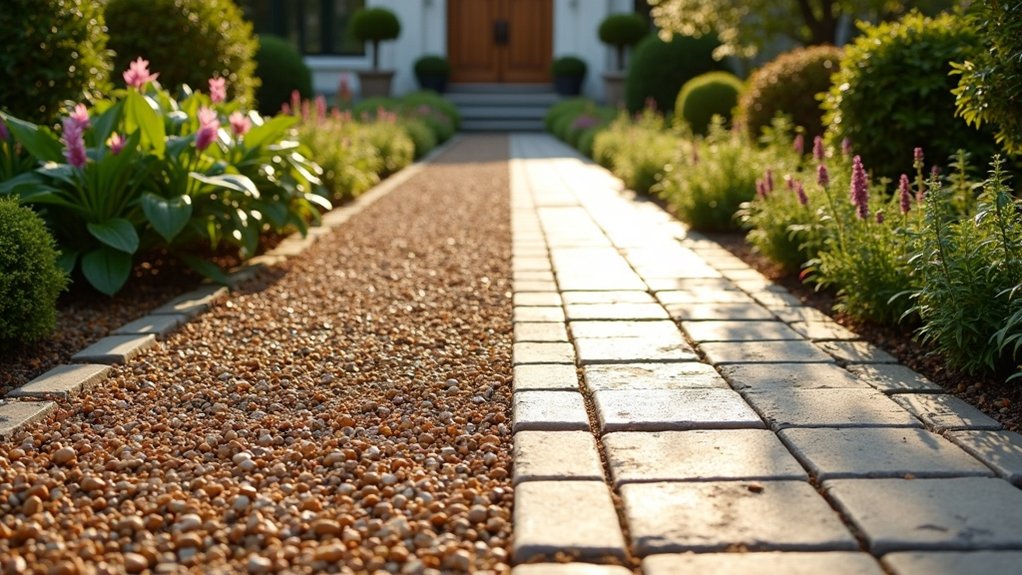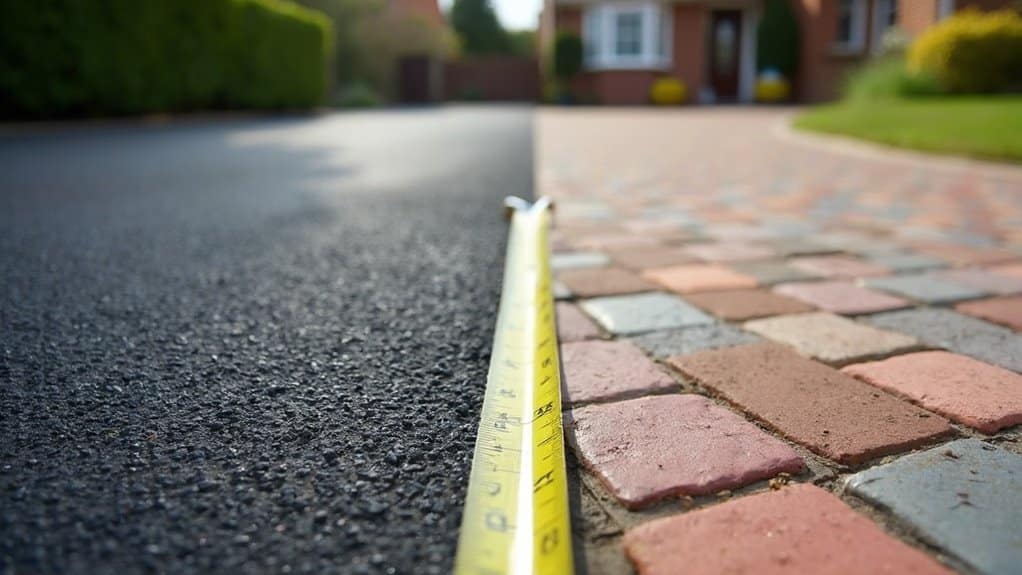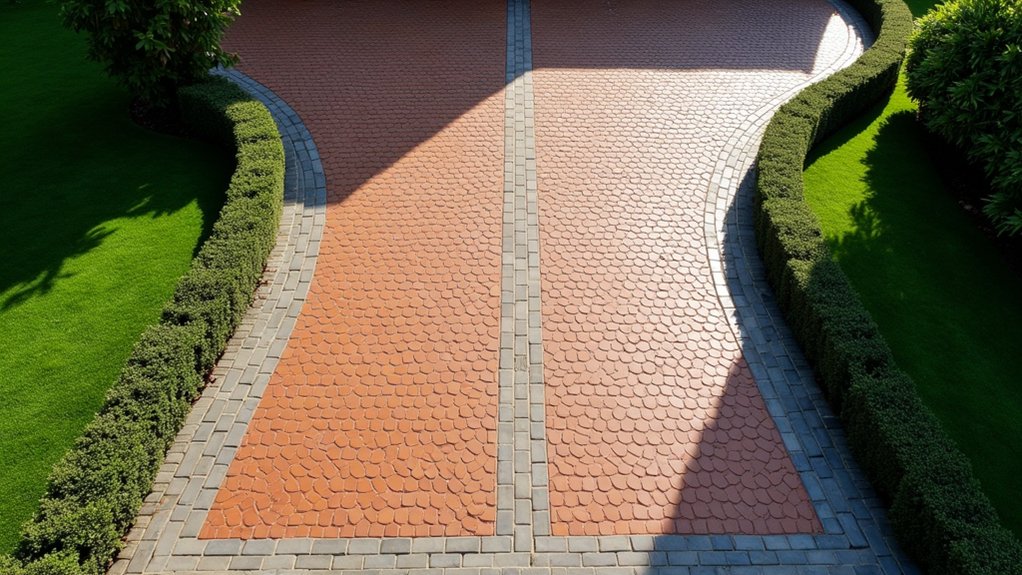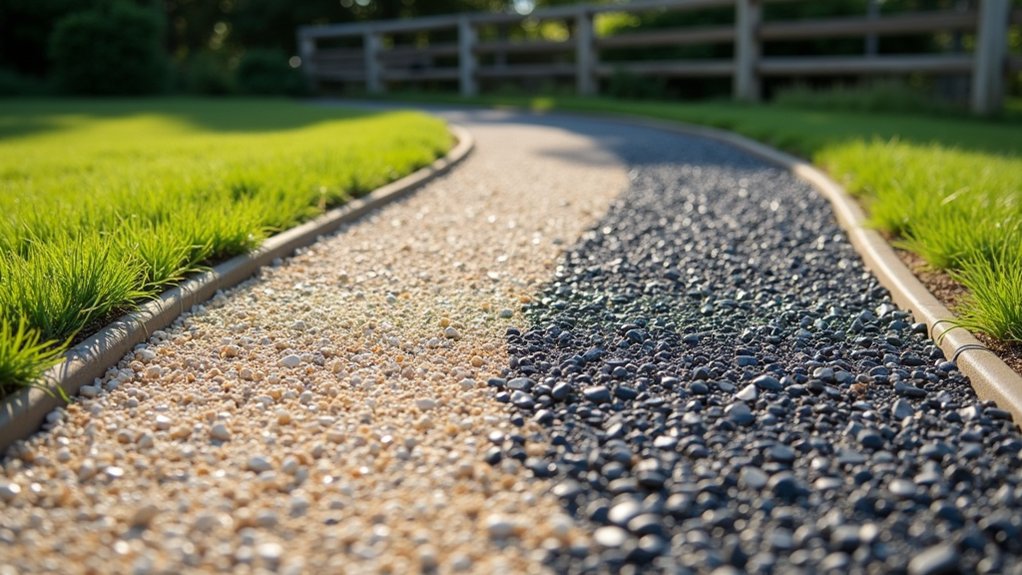When comparing gravel driveways and block paving, gravel can last over 50 years with proper maintenance, whereas block paving usually lasts around 25 years. This is due to block paving’s robust interlocking design, which effectively spreads the load. Gravel driveways require more frequent upkeep, such as addressing displacement and erosion, while block paving mainly needs occasional cleaning and sealing. Knowing these differences can help you choose the right option for your needs. Explore the advantages of each choice to find what suits you best.
Table of Contents
ToggleKey Takeaways
- Gravel driveways can last over 50 years with proper maintenance, whereas block paving typically lasts around 25 years or more.
- The interlocking bricks of block paving offer greater durability, making it more resistant to cracking and the effects of freeze-thaw cycles.
- Gravel requires regular upkeep, such as grading and weed control, which can impact its longevity.
- The quality of installation and local weather conditions play a significant role in how long both materials last.
- In general, well-maintained gravel driveways tend to outlast block paving.
Lifespan Comparison of Gravel and Block Paving
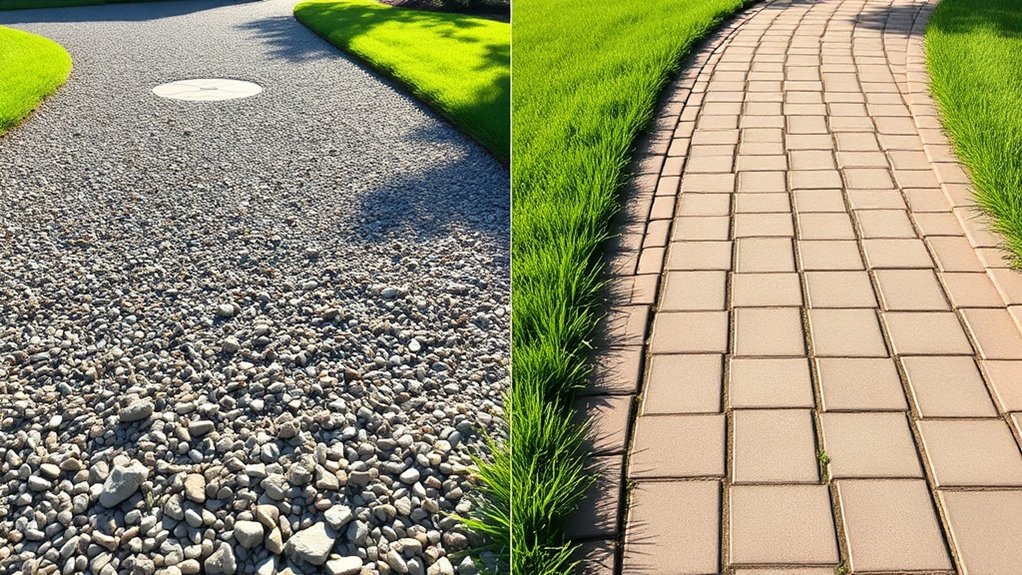
When comparing the lifespans of gravel driveways and block paving, both options have their pros and cons. Gravel can last over 50 years with regular upkeep, such as topping and grading to prevent ruts and potholes. In contrast, paver driveways can last 25+ years with proper installation and maintenance, making them a strong contender in terms of longevity. Additionally, block paving can be designed to be permeable and aid in water management, further enhancing its durability.
On the other hand, block paving generally lasts about 25 years, with the advantage of being able to replace individual pavers and seal the surface every few years to keep it in good shape. While gravel is durable and resistant to cracking, it can become uneven and displaced over time. Block paving, however, is less likely to crack and can better accommodate ground movement due to its flexible design.
Ultimately, your choice will depend on how long you want it to last and how much maintenance you’re willing to commit to, as both materials have unique lifespan traits affected by installation quality and environmental conditions.
Maintenance Requirements for Longevity
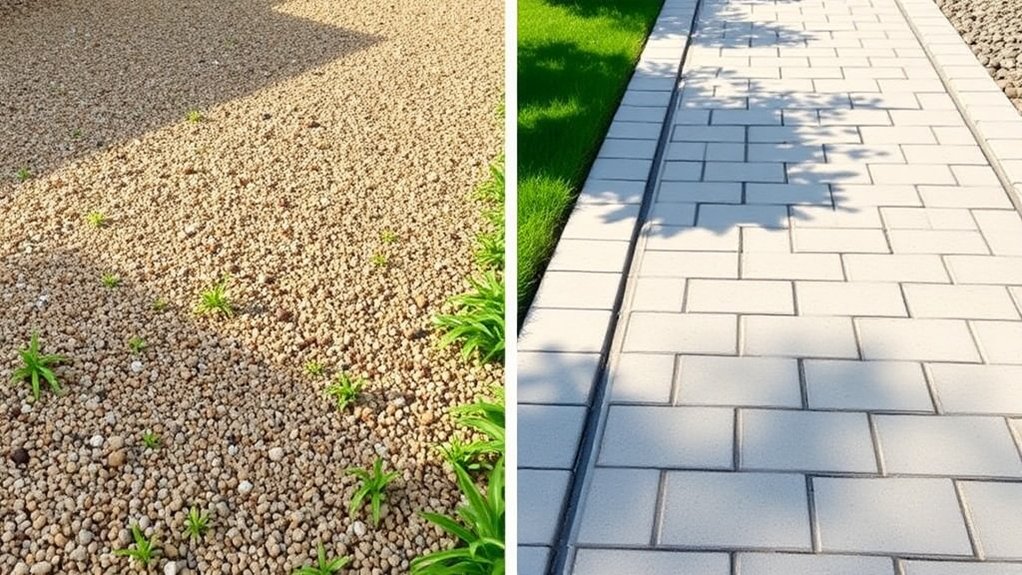
Gravel driveways and block paving both require specific maintenance to ensure they last, but the methods differ.
Gravel driveways need seasonal upkeep, particularly after winter and during autumn when leaves should be cleared to maintain drainage. Regular inspections can help identify minor problems early, potentially cutting repair costs by as much as 50%. Additionally, regular inspection is crucial to assess the condition of the driveway and address issues promptly. Implementing these practices can help prevent issues that may arise from vulnerable surfaces, ensuring the longevity of your driveway.
Frequent grading redistributes the gravel, while replenishing it every 1-3 years replaces compacted stones, which is crucial for structural stability. After adding new gravel, compaction is necessary to prevent it from shifting. Additionally, controlling weeds and managing drainage are vital to protect the driveway’s surface and prevent erosion.
Following these practices will significantly extend the life of your gravel driveway.
Durability Factors and Weather Resistance
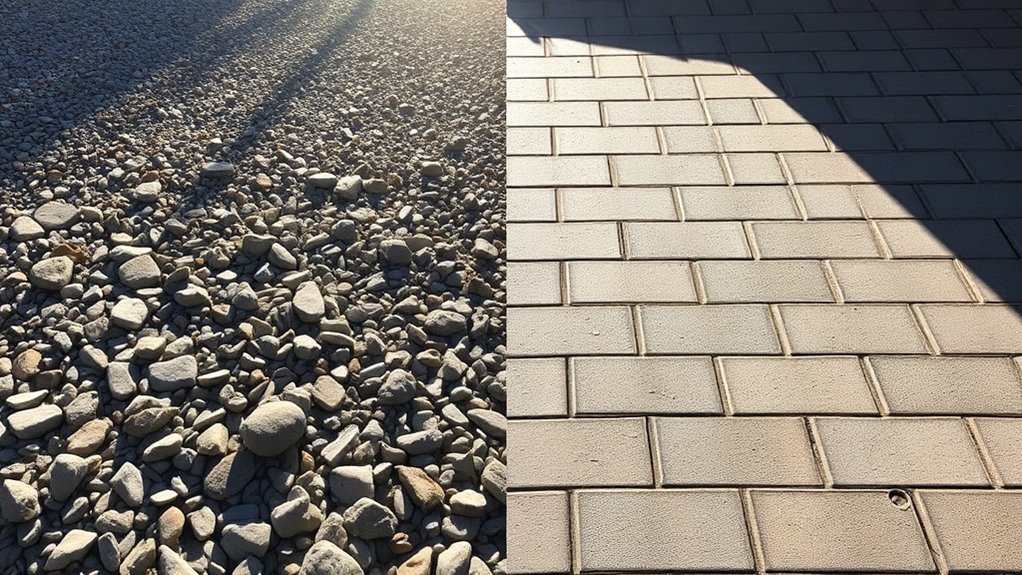
When deciding between gravel driveways and block paving, it’s crucial to consider their durability and weather resistance.
Block paving is generally more durable thanks to its interlocking bricks, which spread the load evenly and can handle heavy traffic without significant wear. It’s also flexible enough to withstand freeze-thaw cycles, reducing the risk of cracking. Additionally, aesthetic appeal can significantly influence the choice of driveway material, as block paving offers a wide range of customizable colors and patterns. Furthermore, block paving often requires minimal maintenance, making it a convenient option for homeowners.
On the other hand, gravel can be affected by weather conditions like erosion and displacement, especially during heavy rain or snowmelt. The loose stones can easily shift, meaning you’ll need to top it up regularly to keep it looking good. Although gravel offers decent drainage, it can lead to uneven surfaces and ruts with constant use.
Cost Considerations and Long-Term Value
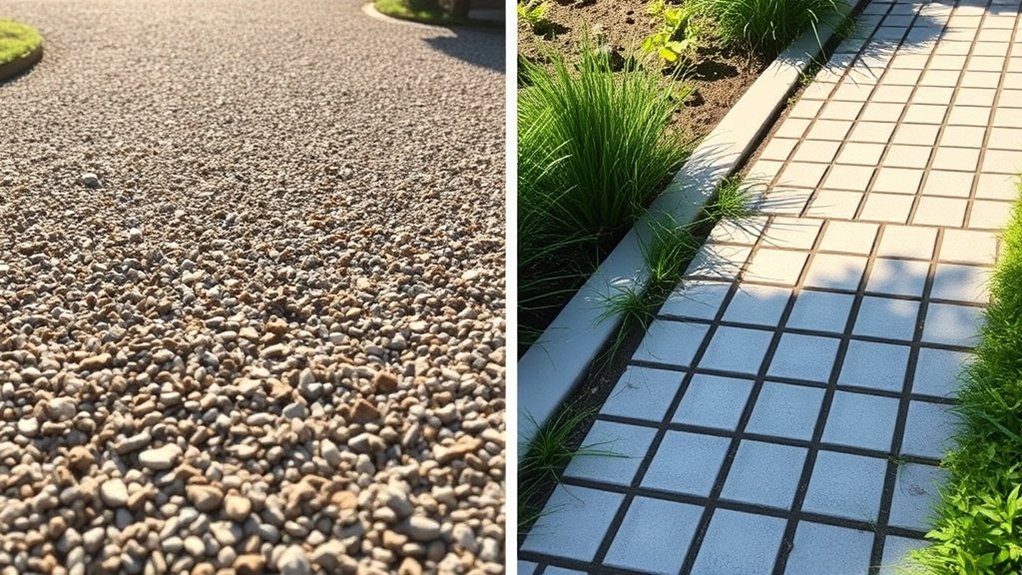
When comparing the costs of gravel driveways and block paving, it’s important to look at both the initial price and the long-term maintenance costs.
Gravel tends to be cheaper upfront, but the ongoing upkeep can add up, affecting its overall value. For example, you might find yourself regularly topping up gravel or dealing with weeds.
On the other hand, block paving requires a bigger initial investment but usually needs less frequent maintenance, which can make it a more cost-effective choice in the long run.
Initial Investment Comparison
When deciding between a gravel driveway and block paving, it’s essential to consider both initial costs and long-term benefits. Gravel is a budget-friendly option, typically costing between £1 and £3 per square foot, while block paving can range from £10 to £50 per square foot. Factors like installation complexity and material availability also play a role in determining overall expenses.
| Driveway Type | Cost per Square Foot |
|---|---|
| Gravel | £1 – £3 |
| Block Paving | £10 – £50 |
| Installation Cost | Low (suitable for DIY) |
| Installation Skill | High (requires professionals) |
Gravel is perfect if you’re looking to keep costs down, while block paving can significantly boost your property’s curb appeal, albeit at a higher initial investment. Your choice will affect both your upfront costs and potential long-term value.
Long-Term Maintenance Costs
Long-term maintenance costs are key when comparing gravel driveways and block paving.
Gravel driveways typically need replenishing every 2 to 3 years, costing around £20 to £70 per tonne, plus the occasional grading. On the other hand, block paving requires resealing every 3 to 5 years, which can set you back between £150 and £300 per application, and you may also need to replace joint sand.
While gravel maintenance is often manageable as a DIY task, block paving usually requires professional assistance, driving up labour costs.
Although the ongoing upkeep for gravel can accumulate, the higher initial maintenance costs of block paving might even out over time due to the less frequent need for intervention.
In the end, consider how often you’ll need to replenish gravel against the long-term value of maintaining block paving.
Environmental Impacts of Each Option
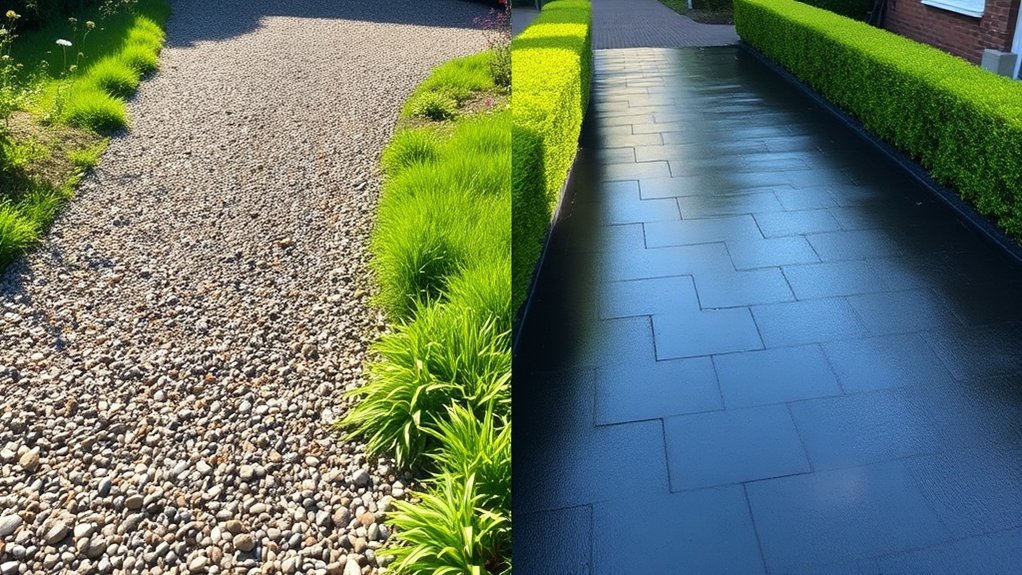
Gravel driveways and block paving both serve a purpose, but their environmental impacts are quite different.
Gravel requires significantly less energy and resources to produce, making it the more eco-friendly option. Its natural porous nature allows rainwater to drain through, replenishing groundwater and reducing surface runoff, which helps prevent flooding and soil erosion.
On the other hand, block paving tends to create solid surfaces that increase stormwater runoff and contribute to erosion. While some block paving uses recycled materials, it generally has a higher energy footprint.
Gravel also boasts sustainability benefits such as easier maintenance and the possibility of reuse, highlighting its environmental strengths.
Safety Implications for Vehicles and Pedestrians
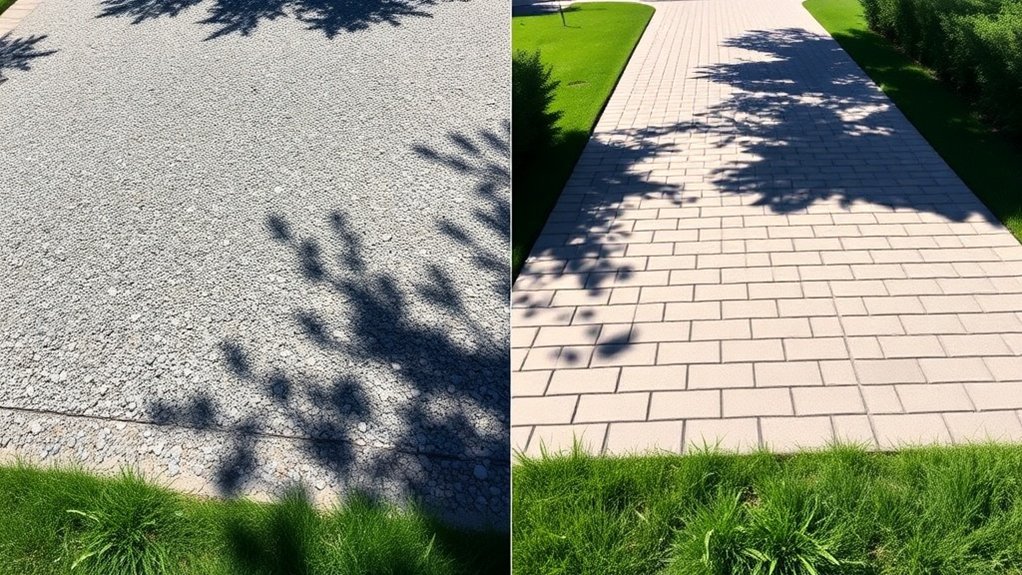
When considering safety for vehicles and pedestrians, surface stability is crucial.
Gravel driveways can shift, reducing traction and creating hazards. In contrast, block paving provides a consistent, stable surface that enhances grip.
Moreover, proper drainage in both options is vital to prevent erosion and maintain safe conditions throughout the year.
Surface Stability Comparison
Surface stability is crucial for the safety of both vehicles and pedestrians, as it directly influences traction, control, and accident risk. Block paving, with its interlocking bricks, provides a stable surface that reduces hazards. In contrast, gravel driveways can shift and develop ruts, posing potential injury risks.
| Surface Type | Stability Features |
|---|---|
| Block Paving | Firm surface, resists ground movement, easy repairs |
| Gravel | Loose stones, prone to displacement, requires upkeep |
| Interlocking Bricks | Minimises cracking, ensures uniformity |
| Maintenance Needs | Less frequent for block paving, higher for gravel |
| Vehicle Safety | Lower risk of damage with block paving; gravel can kick up stones |
Selecting the right surface significantly affects overall safety and stability.
Slip Resistance Factors
Choosing the right driveway surface is crucial for stability and slip resistance, which are vital for the safety of both vehicles and pedestrians. Here are the key factors to consider:
- Aggregate Types: Opt for hard, angular aggregates as they enhance slip resistance. In contrast, softer or rounded aggregates can wear down quickly under traffic, compromising safety.
- Water Impact: Wet conditions can lead to slippery surfaces, making it essential to have good macrotexture for effective drainage and grip. For instance, block paving generally provides better water management than gravel.
- Surface Maintenance: Block paving is easier to clean, which helps prevent debris build-up that can increase slip hazards.
Gravel, on the other hand, can become muddy or waterlogged, raising safety concerns.
Erosion and Drainage Issues
Erosion and drainage issues can significantly affect the safety of vehicles and pedestrians using gravel driveways. Gravel is prone to erosion, so without proper water management, loose material can wash away, leading to dangerous ruts and potholes.
These imperfections increase the risk of vehicle damage and loss of control, particularly in wet or icy conditions.
To prevent erosion, ensure your driveway is well-graded to direct water away from structures. Installing drainage features, like culverts, can further mitigate erosion risks.
Regular maintenance, such as regrading and replenishing gravel, is vital to keeping the surface safe. Ignoring these aspects can create hazardous conditions, including slippery patches that pose serious risks to both drivers and pedestrians.
Repair Flexibility and Ease of Maintenance
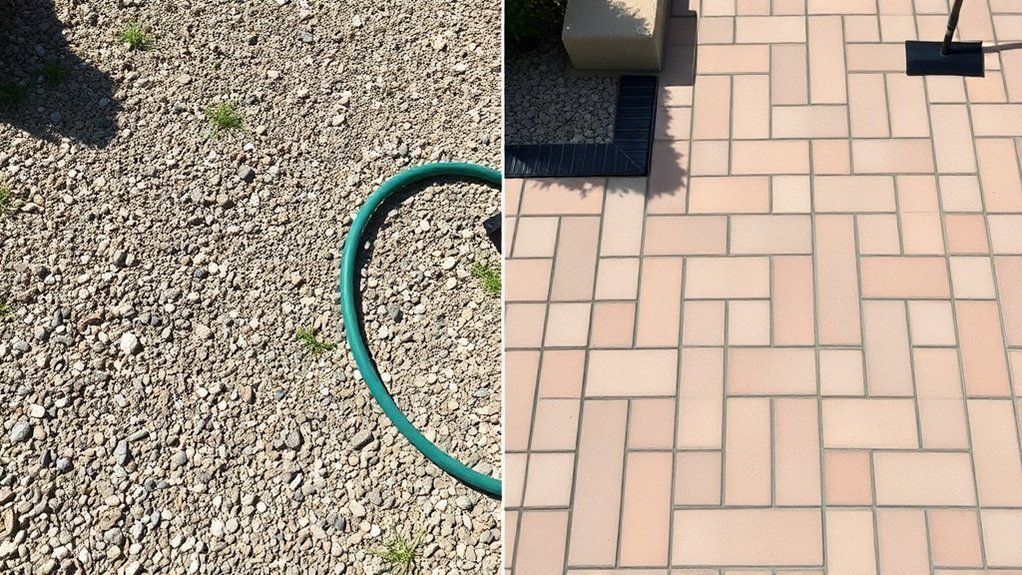
When it comes to repair flexibility and ease of maintenance, gravel driveways and block paving each have their pros and cons that affect their long-term usability. Here’s a straightforward comparison:
- Repair Techniques: Gravel driveways can be easily repaired by anyone, making it a quick DIY task. In contrast, block paving requires skilled professionals to replace damaged blocks, which can be time-consuming and more expensive.
- Maintenance Schedules: Gravel requires regular upkeep, such as raking and adding more stones. Block paving, however, needs less frequent attention, mainly involving cleaning and the occasional seal to maintain its appearance.
- Durability: While gravel is flexible and allows for easy fixes, it can suffer from erosion over time. Block paving, with its interlocking design, is generally more stable and less prone to widespread damage.
Aesthetic Considerations for Driveway Types
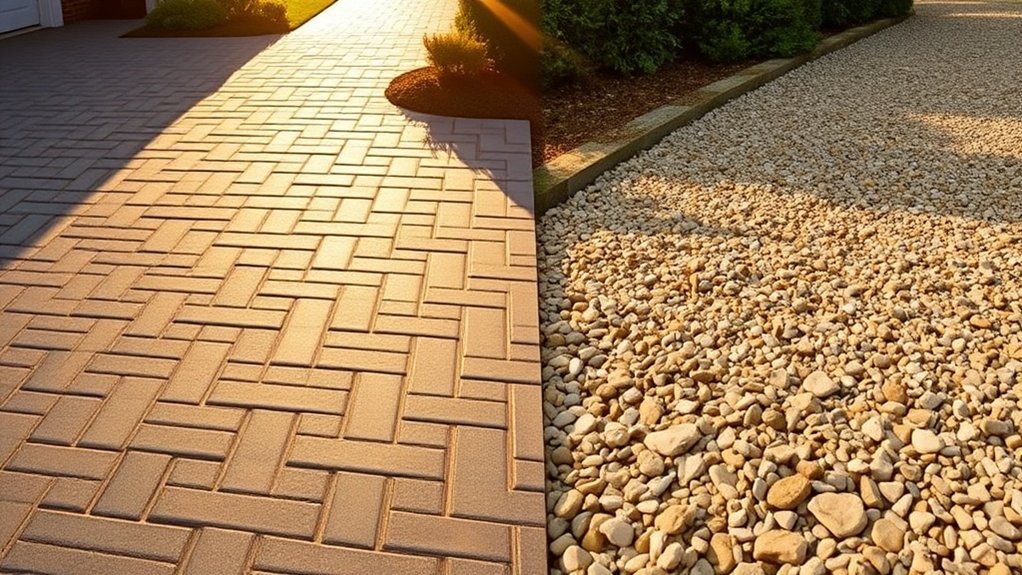
When it comes to driveway aesthetics, gravel and block paving each have their own visual appeal that can significantly affect your property’s overall look. Block paving is highly versatile, allowing for intricate patterns and a wide range of colours and textures. On the other hand, gravel offers a more rustic, natural feel, though it doesn’t provide the same level of design options as block paving.
| Feature | Block Paving | Gravel |
|---|---|---|
| Aesthetic Appeal | High, with custom patterns | Rustic, natural appearance |
| Design Versatility | Extensive options available | Limited customisation |
| Texture | Smooth and even | Loose and uneven |
| Suitability | Complements various styles | Ideal for informal settings |
Ultimately, your choice will depend on the aesthetic you want to achieve and how well it fits with your property’s character.
Final Thoughts on Choosing the Right Driveway
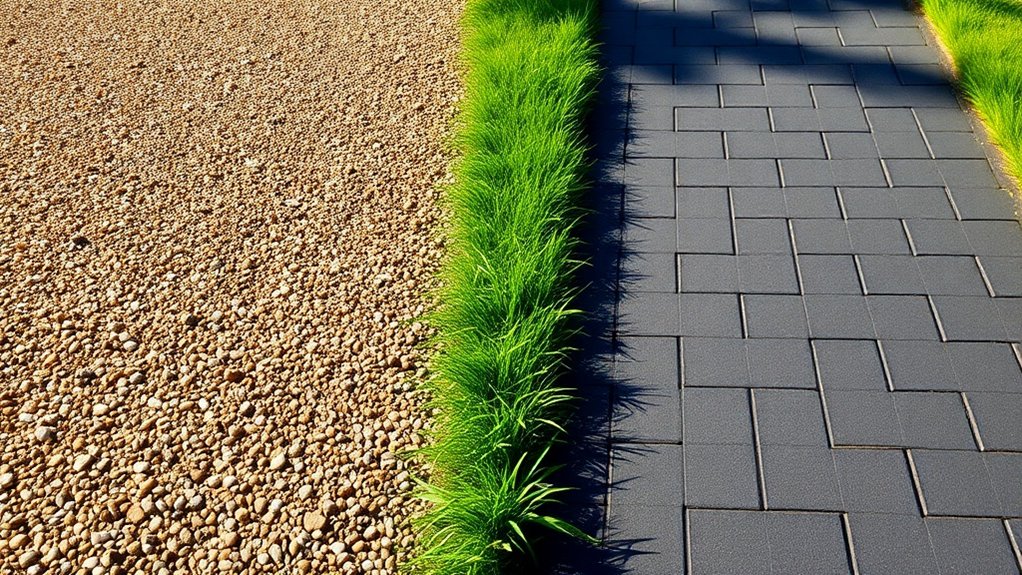
Choosing the right driveway is about more than just looks; it’s crucial to consider durability, maintenance, cost, and environmental impact.
When weighing up gravel versus block paving, keep these points in mind:
- Durability: Gravel can last over 50 years with proper care, while block paving generally lasts around 25 years.
- Maintenance: Gravel requires regular topping and grading, while block paving needs pressure washing and sealing every few years.
- Cost and Long-Term Value: Gravel is cheaper to install initially but comes with ongoing maintenance costs. In contrast, block paving has a higher upfront cost but is easier to repair by replacing individual blocks.
Frequently Asked Questions
Can I Install Gravel or Block Paving Myself?
Yes, you can install gravel or block paving yourself. Just be ready for some challenges along the way. Make sure to use essential DIY tools like shovels and compactors to ensure a stable, long-lasting surface. For example, compacting the base properly is crucial to prevent future sinking or shifting.
How Do Weather Conditions Affect Gravel and Block Paving?
Weather conditions significantly affect the durability of paving surfaces. Gravel can better tolerate freeze-thaw cycles, as it absorbs movement without suffering damage. In contrast, block paving is more prone to cracking under similar conditions. To maximise the lifespan of both surfaces, proper maintenance and effective drainage are crucial, especially during harsh weather.
Are There Color Options for Block Pavers?
Yes, there are many colour options for block pavers, with both warm and cool tones available. This flexibility lets you create personalised patterns and improve the look of your outdoor areas, all while ensuring they remain practical and visually appealing. For instance, you might choose earthy reds for a rustic garden or sleek greys for a modern driveway.
How Does Each Option Impact Property Value?
A paved driveway can significantly enhance your property’s appearance and increase its resale value. It improves curb appeal and adds value, whereas gravel tends to underperform in making your home more desirable on the market. For instance, a well-maintained paved driveway can make a great first impression on potential buyers, while a gravel driveway might detract from the overall appeal.
What Are the Best Maintenance Practices for Gravel Driveways?
To maintain a gravel driveway effectively, regularly remove debris, fill in potholes, and manage weeds. Ensure proper drainage, compact the gravel, and carry out seasonal checks. These practices will help prolong the life of your driveway, improve its stability, and keep it looking good. For instance, clearing leaves and litter can prevent weeds and maintain a tidy appearance. Regular upkeep makes all the difference.
Conclusion
When deciding between gravel and block paving for your driveway, it’s important to consider not only the lifespan but also maintenance, cost, and appearance. For example, a family in a rural area chose gravel and found their driveway washed out after heavy rain, causing delays in their daily routines. In contrast, a neighbour with block paving enjoyed reliable durability and a neat finish. Your choice can affect your day-to-day life and property value, so think carefully about what will work best for your situation.
Looking for an affordable driveway option? Discover the cost differences between tarmac and block paving that could impact your decision.
Get inspired by the best block paving patterns for driveways that blend style and durability; discover which layout will elevate Read more
Keen to enhance your driveway with the right gravel? Discover the best types and find out which one suits your Read more

